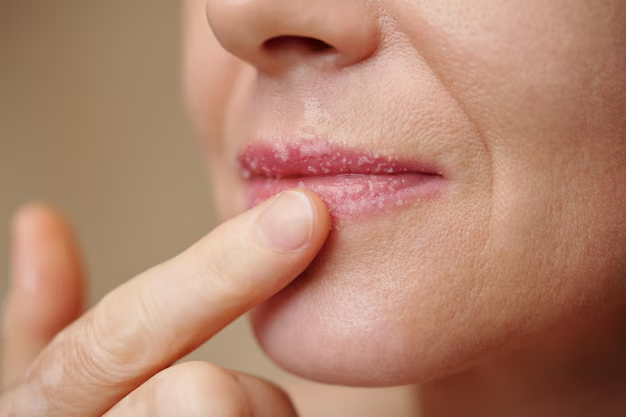Understanding Lip Eczema: What You Need to Know
Eczema, a condition that many people have come to recognize, thanks to its notorious itchiness and rash-inducing symptoms, is generally associated with areas like the hands, arms, and legs. But can it affect your lips as well? The thought of having eczema on your lips might seem strange, but it’s more common than you might think. In this guide, we will explore the intricacies of lip eczema, its causes, and what it means for those who experience this unusual form of dermatitis.
What Is Lip Eczema?
Also known as eczematous cheilitis, lip eczema is a form of dermatitis affecting the lips, causing them to become dry, cracked, and inflamed. Imagine dealing with constant dryness and itching on such a sensitive area—an ordeal anyone would want to avoid. It's an uncomfortable experience that can also lead to pain when eating, speaking, or even smiling.
Symptoms to Look Out For
Lip eczema can present itself in various ways. Common symptoms include:
- Redness and swelling on both upper and lower lips.
- Cracking or splitting of the lip skin.
- Itching, burning, or discomfort.
- Dry, flaking skin or scales.
- Development of small blisters which might ooze or crust over.
Understanding these symptoms can help in identifying the issue early and seeking appropriate assistance.
Causes of Lip Eczema
Eczema doesn't have a singular cause; rather, it’s rooted in a combination of genetic and environmental factors. Let’s delve into some potential triggers specific to lip eczema:
Allergens and Irritants
- Cosmetic products like lipstick or lip balm often contain fragrances or other chemicals that can irritate the lips.
- Certain foods and beverages can also trigger an allergic reaction, leading to eczema on the lips.
- Dental products (toothpaste, mouthwash) often contain ingredients that could provoke a response.
Environmental Factors
- Weather conditions, particularly cold weather, can dry out and aggravate the skin.
- Pollution and other environmental pollutants may exacerbate symptoms.
Underlying Conditions
- People who generally suffer from atopic dermatitis are more susceptible to eczema outbreaks on their lips.
- Stress and hormonal changes are also known to contribute to flare-ups.
Distinguishing Lip Eczema from Other Conditions
With the lip area being particularly prone to a myriad of problems, distinguishing between eczema and other lip conditions is key:
- Cold sores: Typically caused by the herpes simplex virus, cold sores appear as fluid-filled blisters, often accompanied by a fiery sensation before blistering.
- Chapped lips: While similar in appearance due to dryness, chapped lips don't carry the same level of inflammation and itchiness as eczema.
- Allergic reactions manifest similarly but are often caused immediately after exposure to allergens and may resolve quicker than eczema.
Management and Care for Lip Eczema
While we won't delve into specific medical treatments, understanding and managing your eczema is essential for symptom alleviation.
General Care Tips
- Moisturize regularly: Keeping your lips well-moisturized can prevent the skin from cracking.
- Avoid known irritants: If you recognize any particular lip balm, food, or other product that aggravates your lips, steer clear.
- Consult a professional: For persistent problems, seek advice from a healthcare professional to explore suitable skin treatments or allergy tests.
Lifestyle Adjustments
Modifying day-to-day habits can help manage, or potentially reduce, flare-ups:
- Stay hydrated: Drinking plenty of water supports skin health and hydration from the inside out.
- Adopt a balanced diet: Nutrient-rich foods help support skin health, potentially reducing eczema symptoms.
- Manage stress: Stress management techniques like meditation and exercise can help in reducing occurrences and severity of outbreaks.
Nutritional Support for Healthier Lips
Nutrition plays a crucial role in managing dermatological conditions like eczema. Opt for anti-inflammatory foods rich in antioxidants, omega-3 fatty acids, vitamin E, and zinc to support overall skin health.
Foods to Consider
- Fatty fish, rich in omega-3, aids in combating inflammation.
- Nuts and seeds, which contain beneficial fats and vitamins.
- Leafy greens and colorful vegetables, rich in antioxidants and vitamins.
Recognizing the Emotional Impact
Living with a visible condition like lip eczema can be emotionally distressing. It’s crucial to acknowledge and address the potential psychological effects:
- Self-image concerns: Eczema can affect self-esteem and confidence.
- Social interaction: Embarrassment or concern about appearance may impact social lives.
Support from friends, family, and professionals can make a significant difference in overcoming these challenges.
Final Insight
Eczema on the lips, while troubling, can be managed with a diligent approach to care and lifestyle adjustments. Understanding the potential triggers and making informed decisions regarding contact irritants and dietary habits are pivotal steps toward minimizing flare-ups.
Quick Tips Recap 🌟📝
- Hydration: Keep the skin moist.
- Identify and avoid triggers: Cosmetics, foods, etc.
- Consultation: Seek professional advice for persistent symptoms.
- Balanced diet: Maintain skin health through nutrition.
- Stress management: Practice relaxation techniques for overall health.
With an informed perspective and proactive strategy, managing lip eczema effectively is within reach, allowing you to focus more on life’s pleasures and less on discomfort.

